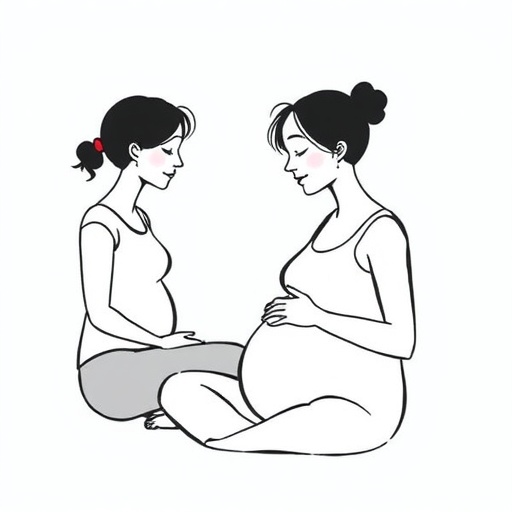In recent years, the intersection of mental health and maternal well-being has increasingly drawn attention from the scientific community, as the impact of psychological stressors during pregnancy is now widely recognized as a critical public health concern. Among these stressors, domestic violence stands out as a particularly pernicious factor that jeopardizes both the mental and physical health of expectant mothers and their unborn children. A groundbreaking study published in BMC Psychology has now brought to light the potential of mindfulness-based group counseling as a powerful therapeutic intervention to alleviate anxiety in pregnant women subjected to the trauma of domestic abuse.
This randomized clinical trial, spearheaded by Azam, Naiersadat, Pouran, and colleagues, meticulously explores how structured mindfulness practices implemented in a group counseling setting can ameliorate anxiety symptoms and contribute to improved mental health outcomes among this vulnerable population. The experimental design involved a rigorous selection process ensuring that participants were pregnant women who had self-reported exposure to domestic violence, thereby focusing the study on a high-risk cohort often neglected in psychosocial research.
Mindfulness, as a psychological construct, entails the deliberate act of paying attention to the present moment with an attitude of openness and non-judgmental awareness. This practice has roots in ancient meditative traditions, but it has been adapted for contemporary clinical use to address a wide spectrum of stress-related disorders. In the context of this study, mindfulness group counseling was carefully tailored to help participants develop self-regulation skills and foster emotional resilience, aiming at diminishing the pervasive anxiety that often accompanies experiences of domestic violence during pregnancy.
The investigators utilized validated anxiety assessment tools before and after the mindfulness intervention to quantitatively measure its therapeutic impact. The choice of group counseling as the delivery format not only made the intervention more accessible and cost-effective but also created a supportive communal environment where women could share experiences and build social connections, which are known protective factors against mental health deterioration.
Results from this rigorously controlled trial reveal statistically significant reductions in anxiety levels among the intervention group compared to the control cohort, which received standard prenatal care without added psychological support. These findings underscore the potential of mindfulness-based therapies to serve as adjunctive mental health interventions in prenatal care settings, particularly for women who face compounded risks due to violence and trauma.
The biological plausibility behind these outcomes can be related to the physiological effects mindfulness exerts on the central nervous system, particularly through the modulation of the hypothalamic-pituitary-adrenal (HPA) axis and the attenuation of cortisol secretion. Anxiety and stress have well-documented neuroendocrine correlates that adversely affect fetal development and birth outcomes; thus, intervening early with mindfulness practices may confer neuroprotective benefits to both mother and child.
Furthermore, group counseling settings leverage peer support mechanisms which not only strengthen emotional bonds but also may reduce feelings of isolation and stigma commonly experienced by victims of domestic violence. This psychosocial support likely acts synergistically with mindfulness techniques, enhancing overall efficacy and promoting sustained mental health improvements beyond the duration of the trial.
The implications of this study extend beyond individual patient care into policy and public health domains. Incorporating mindfulness group counseling as a routine component of prenatal services for women at risk of or currently experiencing domestic violence could represent a paradigm shift in maternity care. Such integration would necessitate training healthcare providers in mindfulness facilitation and establishing multidisciplinary teams capable of addressing the complex needs of abused pregnant women.
Additionally, this research champions a trauma-informed care model that recognizes the pervasive impact of violence on mental health and proactively adapts interventions to be sensitive and responsive to trauma histories. The success demonstrated by this trial advocates for broader application and adaptation of mindfulness modalities across diverse healthcare settings dealing with vulnerable populations.
This study also raises intriguing possibilities for future research, such as delineating the optimal duration and intensity of mindfulness interventions, exploring physiological biomarkers of treatment response, and assessing long-term maternal and neonatal outcomes. It invites an interdisciplinary approach combining psychology, obstetrics, endocrinology, and social work to holistically tackle the multifaceted challenges posed by domestic violence during pregnancy.
Moreover, the use of randomized clinical trial methodology provides robust evidence supporting the causal effect of mindfulness group counseling on anxiety reduction, strengthening the case for evidence-based integration of these practices. It also addresses the need for effective, scalable, and culturally adaptable mental health interventions, an urgent requirement given the prevalence of domestic violence worldwide and the barriers to accessing traditional psychotherapy.
The study’s findings contribute to the burgeoning field of perinatal mental health, shedding light on accessible therapeutic techniques with promising potential to break the cycle of trauma affecting generations. By improving maternal psychological welfare, mindfulness counseling may also positively influence maternal behaviors, prenatal care adherence, and overall life quality, thereby fostering healthier environments for child development.
In summary, this pioneering research eloquently demonstrates that mindfulness-based group counseling offers a viable, effective, and compassionate therapeutic avenue for tackling anxiety in pregnant women exposed to domestic violence. With compelling data supporting its efficacy, healthcare systems should urgently consider adopting mindfulness interventions as standard prenatal mental health care, providing hope and healing for some of the most vulnerable mothers-to-be.
Subject of Research: Anxiety reduction in pregnant women exposed to domestic violence through mindfulness group counseling.
Article Title: The effect of mindfulness group counseling on the anxiety of pregnant women exposed to domestic violence: a randomized clinical trial.
Article References: Azam, K., Naiersadat, T., Pouran, N. et al. The effect of mindfulness group counseling on the anxiety of pregnant women exposed to domestic violence: a randomized clinical trial. BMC Psychol 13, 1076 (2025). https://doi.org/10.1186/s40359-025-03358-9
Image Credits: AI Generated




